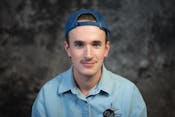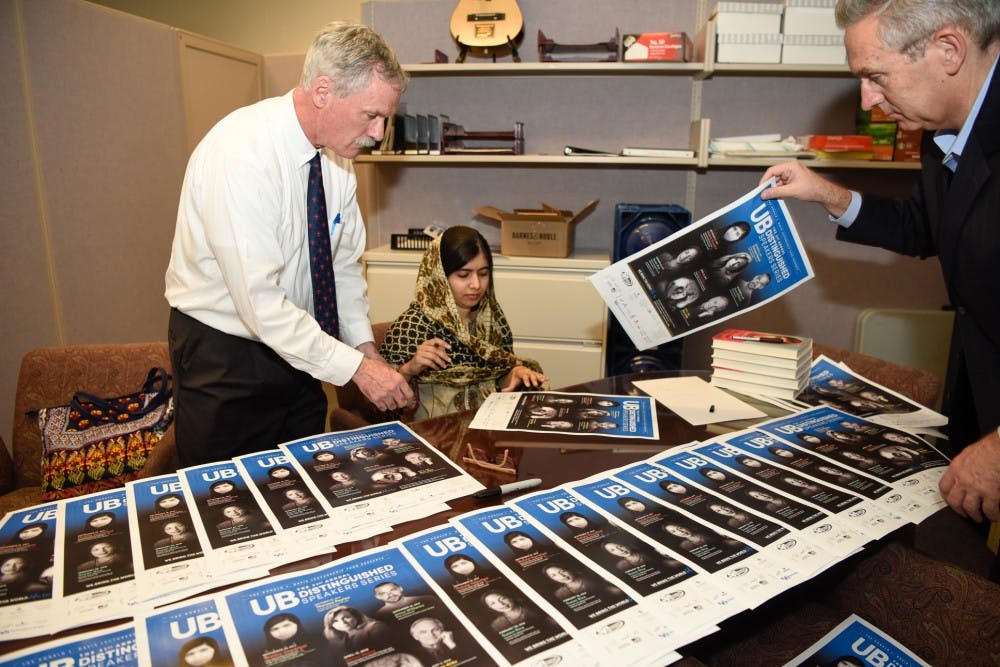For William Regan, the UB Distinguished Speakers Series is all about the process.
Regan, director of the Office of University Events, said some event preparations may not hold a lot of glamour, but the behind-the-scenes brunt work by his staff and other UB units makes it all possible by showtime.
“Every service on this campus is going to be involved in one way, shape or form in these events,” Regan said. “We have a pretty well-oiled machine and we’ve got a great team on this campus to support a program like this.”
On Thursday, UB will kick off its 32nd edition of the Distinguished Speakers Series. Former Vice President Joe Biden will be the undergraduate student-choice speaker and will speak in Alumni Arena at 7:30 p.m.
The annual lecture-based series invites politicians, entertainers, scientists and a number of other innovators to UB every year. The series is sponsored through money from the Donald L. Davis Lectureship Fund and entities such as the Undergraduate Student Association, the Graduate Student Association, the UB School of Management and more.
Over the past three decades, the series has featured five former presidents and vice presidents. Former Vice President Biden will be the sixth of his background to speak in the series.
Regan, a UB ‘92 and ‘80 alum, started working at UB in 1980 and joined the Office of University Events (then the Office of Special Events) in 1988. The office started the series in 1987, when Regan said it was a simpler gig than it is today.
Geraldine Ferraro, the first female vice presidential candidate on the National Party ticket, kicked off the series over 30 years ago. In the series’ first years, politicians and political journalists were the program’s beating heart. By its second year, the series featured former Presidents Gerald Ford and Jimmy Carter.
“The series started out as a program that focused on the power of the presidency, and you can only run that for so many years before you have to open it up,” Regan said.
“Both in terms of direction and quantity, we have expanded the focus of the series to be more broad and not limit our speaking events. Not to say we don’t continue political thinking, it’s inescapable, but you certainly want to celebrate the arts, to feature business [people] and changemakers.”
When it comes to getting ideas for speakers, Regan said his office can’t do things in a vacuum. He said he wants to hear from outside sponsors but also UB sponsors, including the Student Association, Graduate Student Association and the Minority Faculty and Staff Association.
Regan said finding speakers for the series is a process of exploration and an intersection of ideas from his office and other people.
“Invariably, there is an intersection, there are people who fit the profile as far as what I know will be successful and what is possible with what they want,” he said.
“If there is one word that is definitive about how this all comes together is it’s a process. There’s a lot of communication, there’s a lot of back and forth, there’s hit and miss because you aren’t always going to get your first choice but you got to have an attitude where you’re stepping up to the plate.”
Before the speaker appears on stage, a backlog of behind-the-scenes transactions are made by the Office of University Events. On one level, Regan said, it’s about the business side of things but another side is the series’ long-standing history in bringing distinguished visitors to campus.
“When you’ve got a track record that goes past 30 years, there’s a confidence factor that allows speaker agencies to put our bid on top or to notice that this is a good request,” Regan said.
“With a speaker agency, their first allegiance is with the speaker. That’s their bread and butter so they want to deliver to their speakers speaking opportunities that are going to be successful and we bring that level of success that makes us dependable. We’ll get the yesses more often than the no’s because we’re a good event.”
For some speakers, Regan said, there’s a waiting period between UB’s request and an answer. But for others, such as Ronan Farrow or Lisa Genova, the Office of University Events gets an answer in a matter of days.
After the informal agreement, the speech then comes down to a contract.
“There’s a lot of that that goes on, but once the ink is on the contract it’s just again another process of getting the logistics lined up, the ticketing operation together, fulfillment of our series subscriptions and so on,” Regan said.
Regan recognizes the number of offices and departments that dedicate their time to make the series possible, from Athletics and the Center for the Arts to Parking and Transportation. Regan sees the series as a “labor intensive, resource intensive” program, but he said his accounting department’s support and oversight ensures the university doesn’t regret the series’ costs.
As for Biden’s visit on Thursday, he will add his name to the list of presidents and former vice presidents who have visited UB. The last time a former or sitting president visited UB was in 2013, when then-President Barack Obama spoke at Alumni Arena (not part of the Distinguished Speaker Series).
When political figures such as Biden come to campus, Regan said the biggest difference from other events is the level of security detail. Still, Regan said UB has handled speakers such as Biden in the past and UB has developed a set of practices to best host the series’ events.
“But you do have to be vigilant, there’s always new wrinkles at every event and that’s part of what makes my job exciting,” Regan said. “Even though one speaker event to the next is seemingly routine, there are enough differences from one event to the next that make them all unique. They’re all bringing something different that will require a different aggregate of attention and details.”
Regan said it’s hard to single out one or two speakers at the expense of the one-hundred-plus other speakers who have spoken at UB.
Still, he remembers Cornel West’s on-stage shout-out to him, Elie Wiesel’s intense and profound speech at the Center for the Arts, and magician David Blaine’s attention to detail in preparing a water tank for an act at UB.
And although the series is getting older, its in-person presentation is continuing to change.
On Nov. 14, Peter Diamandis’ speech at the Center for the Arts will be livestreamed to audiences in Buffalo and beyond. The stream marks the first of its kind in the series’ history. The event is sponsored by TIAA, a financial service organization celebrating its 100th anniversary.
Regan said he sees the stream as adding more value to the program.
“Diamandis’ speech is about a convergence of interests where we saw this opportunity and we’re partnering with TIAA on this program,” Regan said “His talk, his vision and his take on the future will be very valuable as far as demonstrating TIAA’s clientele, to [see] what are the emerging technologies, what do we need to know about them and how disruptive are they going to be.”
With Biden’s visit just days away, Regan said the UB community can anticipate a speech on the number of political strifes going on in Washington, D.C.
“I think what is going to be important is him asking how we can restore collegial government, and get people talking to one another - mainly, leadership,” Regan said. “I think that’s what the students seem to want to see, what his folks have talked to us about: about finding common ground and civility again.”
Benjamin Blanchet is the senior features editor and can be reached at benjamin.blanchet@ubspectrum.com and @BenjaminUBSpec on Twitter.

Benjamin Blanchet is the senior engagement editor for The Spectrum. His words have been seen in The Buffalo News (Gusto) and The Sun newspapers of Western New York. Loves cryptoquip and double-doubles.





